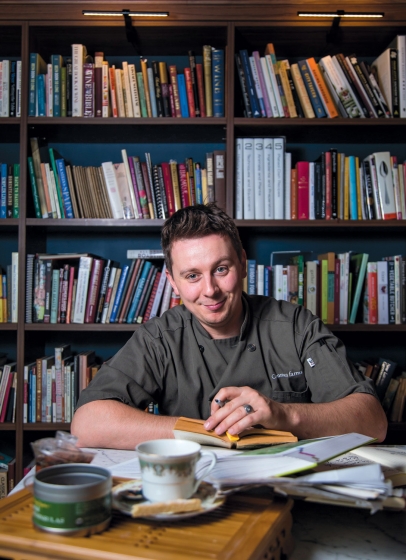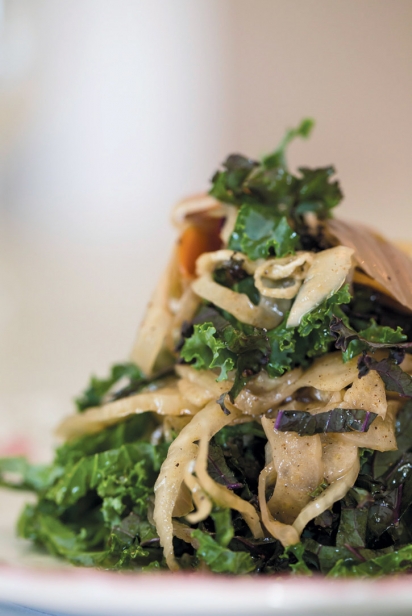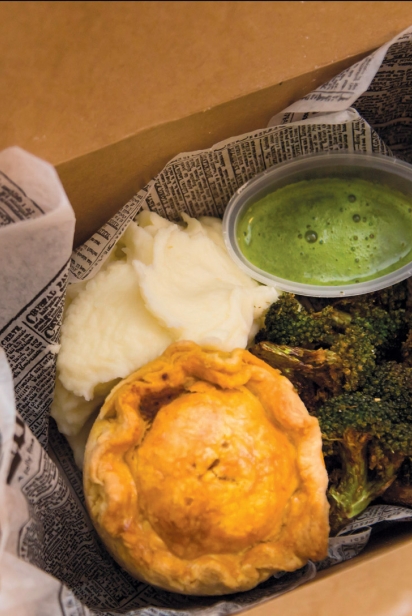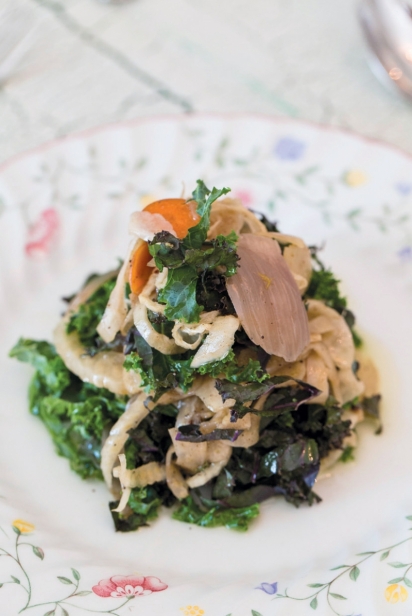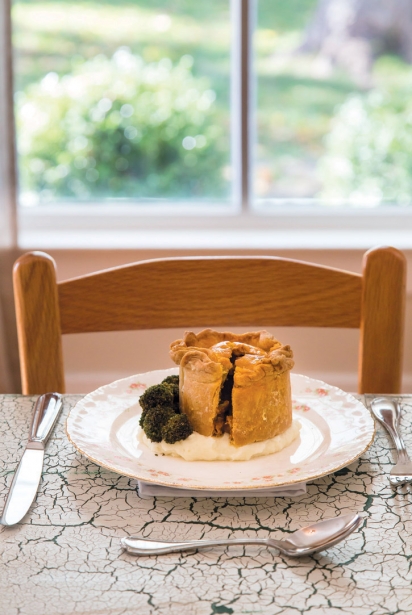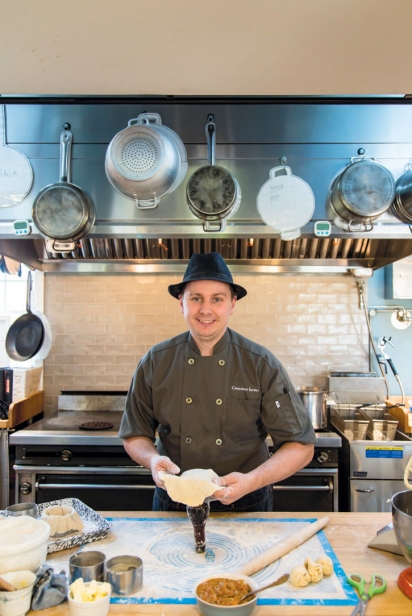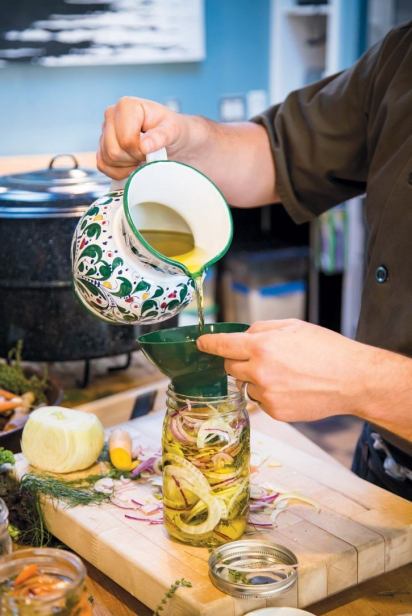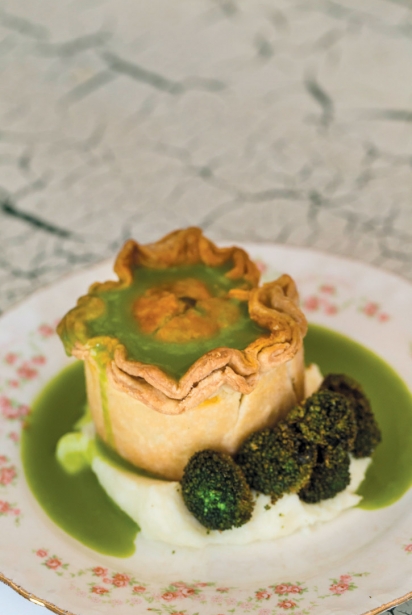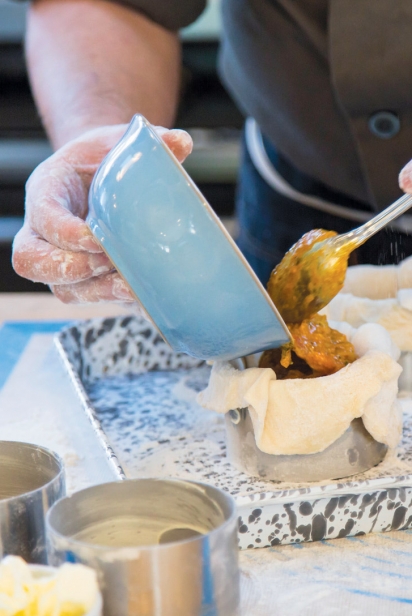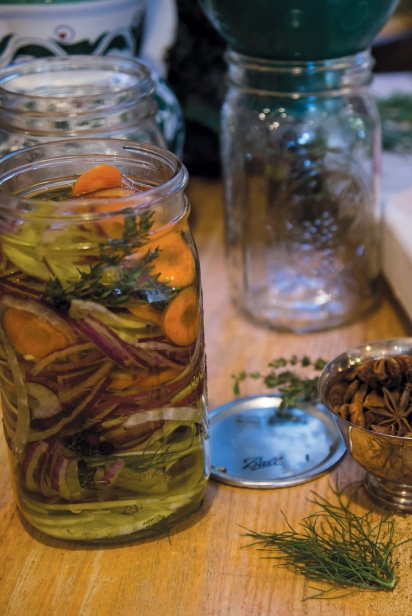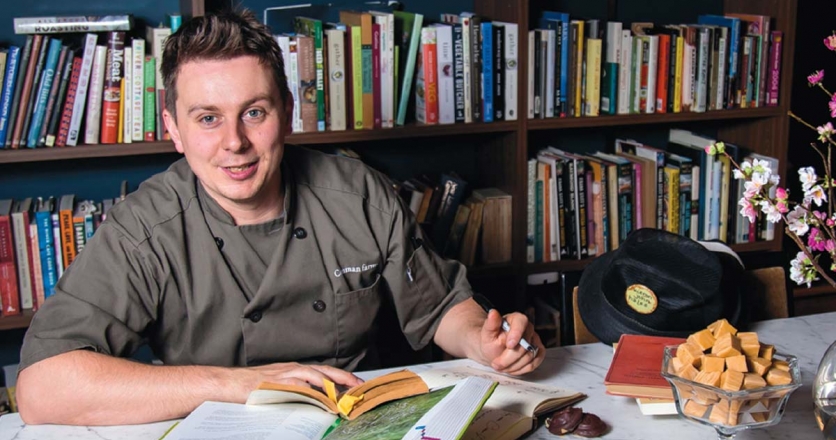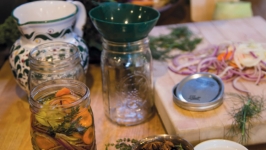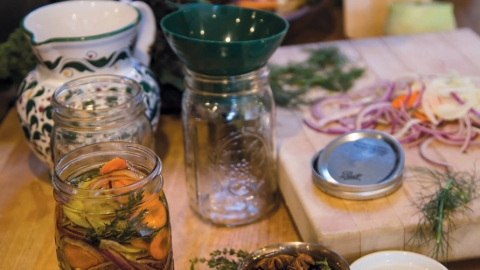Cornman Farms' Kieron Hales: A Culinary Storyteller for our Times
With ruddy cheeks, twinkling eyes and unfettered energy, Chef Kieron Hales sits on the edge of his chair as he springs into the deep dive of his life and times— from his precocious culinary beginnings to cooking for the rich and famous to becoming co-owner and head chef at Zingerman’s Cornman Farms.
Born in 1982—the same year that Ari Weinzweig and Paul Saginaw opened the Zingerman’s Deli in Ann Arbor—Kieron spent his childhood in the small agricultural village of Stoke Gabriel in South Devon, England. Learning knitting and farming along with traditional schoolwork in a three-room schoolhouse, Kieron attributes much of his ongoing fascination with making “food with stories” and his love of cooking to his mother, Lindsay Hales, and his upbringing.
“My mother was an amazing cook,” he says, grinning, “in order to survive my grandmother’s cooking, more than anything.” He recalls horrid meals of rock cakes (“you could build buildings out of ’em”) and crunchy raw pasta in tinned tomatoes that his grandmother would serve up as spaghetti. But his mother excelled at cooking and hoarded cookbooks—a passion she passed on to her son, who has accumulated a collection of over 8,000 of them.
She was strongly supportive of his culinary career path, which began at age 13, after his father passed away, when he left home to pursue a Modern Apprenticeship in London—one of last Modern Apprenticeships in the UK at the time. Kieron was the youngest person to be accepted and spent the next few years living and working in kitchens in London, Bournemouth and Poole, and in Burgundy, France.
To supplement his meager apprenticeship income while trying to survive in London he pulled extra shifts at other restaurants to get meals and soon “bushwhacked” his way into the Royal Palace, where he worked a couple of times a month in the pastry kitchen. “And so I got the privilege of cooking the Queen’s little chocolate cake that she had this obsession about,” he remembers fondly.
After graduating, Kieron traveled and worked in 27 different countries in a succession of chef positions in many different styles of restaurants, cuisines and kitchens. “It was a really fun experience,” he says, “but it was exhausting, between the constant traveling and the work hours.” And it was when he finally settled into the White Barn Inn and helped to open Stripers Waterside Restaurant in Kennebunkport, Maine (where he orchestrated cooking for a Bush family wedding attended by three presidents), that he had one of the pivotal moments in his career.
“Somebody asked me ‘Where did this food come from?’” And while he knew that it was the very best food you could buy, he couldn’t tell the food story. “Rather than just knowing I’d bought the best, I wanted to know the histories and the stories behind it.”
So he took a “rather large cut in pay” of over $100,000 to go back to the UK and work at a small, independent restaurant in England, to “get back to the roots of where the food I was getting was coming from.” He continues, “I’d worked in a lot of one-, two- and three-star Michelin restaurants and so I knew how to make beautiful food, cook it really well … But the passion behind the food was missing— the ‘why’ I really wanted to do it.”
Returning to England and filling in some of the foundation blocks he felt he had missed along his path brought Kieron another epiphany: He wanted to be an owner. After working 120-hour weeks for other people, he felt it was time to do it for himself. But how? Most family-owned restaurants don’t want to sell “forever” purchases or even small shares, he found. But through his good friend and long-time mentor Randolph Hodgson, owner of Neal’s Yard Dairy in London, Kieron was introduced to Ari Weinzweig of Zingerman’s, who was also active in the American Cheese Society.
The fateful phone call came: “Ari’s in town, do you want us to come over tonight?” It was a Sunday night, when the small, independent fish restaurant Kieron was chefing at in Norfolk was closed, so he opened it up and cooked for Ari and Randolph. That was followed by hours of conversation and a two-day cheese tour of Middle England, during which Ari convinced Kieron that there was an opportunity for him to be an owner in the Zingerman’s family of businesses.
Kieron began his journey at Zingerman’s in 2008, quickly rising to head chef at the Roadhouse. It was the first place he’d ever cooked a burger. “Definitely the first place I’d thrown a pig on my shoulder and into a fiery pit,” he laughs. It was during that time, while working with executive Chef Alex Young, that the Roadhouse’s macaroni and cheese was named America’s best comfort food by the Food Network’s Alton Brown and when Chef Alex, now executive chef-owner at The Standard Bistro and Larder, won a James Beard Award. At the time, they were working with 28 small, local farms and had stepped up their local meat program, buying and breaking down whole carcasses from local purveyors. But Kieron had set his sights on Cornman Farms. “My desire from the moment I wanted to be over here was to be out at the farm.”
Kieron recounts that the original house on Cornman Farms, located just outside of Dexter, was built in 1834 by Judge Samuel William Dexter for a Dr. Gray, in order to bring a doctor to the community. After the barn was completed in 1887, the property was turned into a 600-acre dairy farm to help support the doctor, who commuted between Dexter and Detroit. The property was sold a few years later to the Hoy family, who owned it until Zingerman’s purchased it as a 42-acre parcel containing the house and the barn. But Cornman Farms actually had its roots on Alex Young’s personal property, located just down the road, as a backyard garden business component of the Roadhouse. “That’s why we’re here,” Kieron muses. But the larger vision for what it could become was in the works.
In the best of Zingerman’s traditions, Kieron wrote his vision during a Zing Train seminar. With Ari standing behind him, Kieron crafted a vision for Cornman Farms that read like a homesteading template. He wrote, “We were a bed and breakfast, an event space, doing weddings, canning and jarring. That we had bees and were making candles and perfumes. And were making a bunch of wonderful kitchenware that we could sell as well.”
Guided by this vision, Kieron and his small team did a bit of everything that first year after they opened in May 2014, following two years and millions of dollars in renovation work on the barn and the property. While some parts of the vision, like the bed and breakfast, are on the back burner for now, they became cash-profitable in their second year and currently have net operating profits—and were the only non-tech company to win the Ann Arbor Spark fast-track award several years in a row for double-digit growth. Kieron credits his original team member Margaret Wilson and his current managing business partner Tabitha Mason, along with their sales and marketing director Liza Olympitis, with inspiring and helping to drive this success.
One of their innovative approaches to expanding revenue opportunities beyond the potential for hosting on-site events is doing publicly ticketed food events, like their pop-up Pie & Mash series. Embracing one of Kieron’s most beloved food memories, Pie & Mash evokes the eponymous food shops found throughout London, which were historically Eel and Oyster shops, making jellied eel and oyster pies from the River Thames before they became too scarce. Cornman Farms began this series several winters ago to entice people out to the farm during the slower season and these have been so successful that there are plans in the works to market them nationwide. The pies, filled with savory chicken tikka masala, beef and onion or beef Burgundy and topped with a vibrant green and garlicky parsley liquor sauce, warmly capture the essence of storytelling through comfort food.
Cornman Farms also does community outreach by offering a series of classes called Soup to Sources, teaching ways to take simple preparations and spread them out into several dishes or meals, often incorporating items to jar or can in order to preserve the seasons.
But the core focus of Cornman Farms’ vision remains bringing their locally sourced and seasonal foods to custom menus created for their event clients. “We really care about what we do,” Kieron says. “The people who come here—our brides and grooms and event guests—we want to be their friends forever. It’s about that feeling of nostalgia, that feeling of community when you’re here.” Catering to their clients’ tastes and food memories—even raising a specific plant in their garden two years out from the event in order to incorporate it in the menu—is both Kieron’s challenge and his passion. And making “food with stories” is his culinary script.


